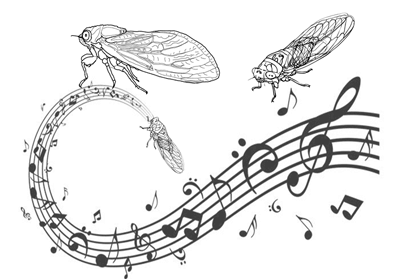LOUD-SOUNDING CICADA

The event LOUD-SOUNDING CICADA is part of "Athens 2018 World Book Capital" City of Athens, of which major donor is Stavros Niarchos Foundation.
In collaboration with: Laboratory of Music Acoustics and Technology, National and Kapodistrian University of Athens
LOUD-SOUNDING CICADA (Ηχέτα τέττιξ)
Sound instalation on the Platonic Cicadas
Anastasia Georgaki, Associate Professor, Music Department, National and Kapodistrian University of Athens
Participating: Yiorgos Mizithras, Anna Sartzidou, Liana Gkiozou
LOUD-SOUNDING CICADA (Ηχέτα Τέττιξ) is an immersive space for mixing the senses where sounds of real and electronic cicadas are being transformed into virtual voices tuned in the ancient Greek modes in order to emerge contemporary political situation of the ‘eternal’ debt. Recordings from real archeological spaces like the Αcademy of Plato, Ancient Αgora, Ιlissos and Kerameikos cemeteries consist the image of wonderful archeo-soundscape. All these acoustic information compose the immersive environment of the Platonic cicadas as they appear like the metamorphosis of the human beings in the Platonic Phaedrus [Phaedrus, 259b-259d]
About Tettigology
Tettigology has its roots in ancient civilization from Ancient China to Ancient Greece. More precisely, the cicada have so many and varied appearances in Greek culture: in literature, in the visual arts, in folklore but also in scientific writing, philosophy and religion. The ancient tettix (cicada) is one of the most inspirational insects for philosophers, poets and musicians of Ancient Greece. From the famous myth of Esope about the lazy singing cicadas (sic) and the working ants which has survived and is being taught in the schools till our days and the myth of Tithonus and Dawn (Ηώ) about the search for eternal youth, several myths have survived on the cicadas in the Greek and Roman literature.
The most inspirational story about the cicadas which has many allegoric interpretations about the immortality and resurrection of the souls, is discussed in Phaedrus, a dialogue authored by Plato: Socrates and his student Phaedrus, engage in thoughtful repartee in an earthy setting by a lush riverbank which nowadays is situated at St. Foteini, in the shade of a tree occupied by a chorus of cicadas. The Cicadas chirp and watch to see whether their music lulls humans to laziness or whether the humans can resist their sweet song. According to the dialogue Cicadas were originally humans who, in ancient times, allowed the first Muses to enchant them into singing and dancing so long that they stopped eating and sleeping and actually died without noticing it. The Muses rewarded them with the gift of never needing food or sleep, but to sing from birth to death.
The task of the Cicadas is to watch the humans in order to report to the Muses who honors them and who doesn’t.
References:
GEORGAKI A.: “Μapping the cicada of the ancient agora: from myth to reality”, in in Music and sound ecology: musicological and philosophical views, l’Harmattan, Paris 2014
PLATO, Phaedrus (259b - 259c)
SOCRATES [259b] It is quite improper for a lover of the Muses never to have heard of such things. The story goes that these cicadas were once men, before the birth of the Muses, and when the Muses were born and song appeared, some of the men were so overcome with delight [259c] that they sang and sang, forgetting food and drink, until at last unconsciously they died. From them the cicada tribe afterwards arose, and they have this gift from the Muses, that from the time of their birth they need no sustenance, but sing continually, without food or drink, until they die, when they go to the Muses and report who honors each of them on earth.
HESIOD, Works and Days (582-583)
When the golden thistle is in bloom and the loud-sounding cicada,
perched on a tree, pours down his clearly-heard song
incessantly from under his wings, in the season of summer,
Athens 2018 World Book Capital - City of Athens is made possible thanks to its donors and contributors. Major Donor is Stavros Niarchos Foundation. Gold Donors are John S. Latsis Public Benefit Foundation and Core SA. Donors are Onassis Foundation, Welfare Foundation for Social & Cultural Affairs, Laskaridis Foundation and Greek Collecting Society for Literary Works (OSDEL). Valuable contributors are Aegean Airlines, Athens International Airport, and Urban Rail Transport SA (STASY).
Back

